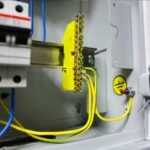Indoor air quality and system efficiency often come down to one simple but crucial maintenance task: changing the HVAC filter. Many homeowners don’t think about their air filters until a problem arises—maybe the house feels stuffy, the system is straining, or energy bills suddenly rise. However, regular filter changes can prevent these issues before they start. A clean filter helps your heating and cooling equipment run smoothly, protects internal components, and keeps air circulation clean and healthy. We will explore why HVAC contractors strongly encourage routine filter changes and how this small step makes a big impact over time.
Reasons HVAC Contractors Encourage Routine Filter Changes
-
Clean Filters Help Maintain Airflow and Reduce Strain on the System
When air filters become clogged with dust, pet hair, pollen, and other particles, they make it harder for your HVAC system to circulate air effectively. The blower fan has to work harder to push air through a restricted filter, which can cause the system to overheat or shut down prematurely. Restricted airflow compromises comfort and places mechanical stress on components like the blower motor, compressor, and heat exchanger.
Over time, this added strain can lead to more frequent breakdowns and shorten the system’s overall lifespan. Clean filters allow air to flow freely, which helps maintain consistent temperatures throughout the home and ensures that conditioned air reaches every room as intended. A clogged filter can prevent the unit from adjusting correctly in systems that rely on variable-speed fans, leading to poor regulation and uncomfortable fluctuations. Additionally, restricted airflow often results in higher energy usage. When the system has to work harder, it uses more power, and that increase shows up in your utility bills. Simply replacing a dirty filter can restore efficiency and reduce unnecessary energy waste.
For those with multi-level homes or zoned systems, unrestricted airflow becomes even more essential. Each zone or floor requires balanced air distribution, and a clean filter supports that balance by removing obstructions from the equation. Changing filters regularly can also protect more advanced features like smart thermostats or humidity control, which depend on consistent system performance to function correctly. Those features can malfunction or provide inaccurate readings when airflow is hindered, reducing their effectiveness. Regularly checking and replacing filters helps homeowners avoid these hidden consequences and ensures that the entire HVAC system runs how it was designed. It’s an essential habit that pays dividends in performance, comfort, and cost.
-
Improved Indoor Air Quality Begins With a Fresh Filter
HVAC filters are the front line of defense regarding indoor air quality. Daily, the air inside your home circulates through the HVAC system multiple times. Each time, it passes through the filter, which captures airborne particles like dust, mold spores, smoke, dander, and allergens. If the filter is clogged or dirty, it can no longer trap these contaminants effectively. That means more particles remain in your air, affecting comfort and health. For households with pets, allergies, asthma, or other respiratory concerns, the filter’s condition becomes even more important. A clean filter removes irritants before inhaling them, creating a safer and more pleasant indoor environment.
In contrast, a dirty filter may not only fail to remove pollutants but could also reintroduce them into the airflow if particles break free and circulate again. This can lead to stale air, unpleasant odors, and lingering dust on furniture and surfaces. Some filters are rated with a MERV (Minimum Efficiency Reporting Value) score, which indicates how effectively they capture particles of different sizes. Even if you use a higher-rated filter, regular replacement is still necessary because all filters become less effective as they fill up with debris. In some homes, especially those near construction zones or heavy traffic areas, filters may need to be changed more frequently due to higher airborne dust levels.
The cleaner your filter, the cleaner your home’s air will be—which can translate to fewer allergy flare-ups, better sleep, and a reduced risk of illness. Keeping filters fresh also prevents microbial buildup inside the HVAC system. When combined with a dirty filter, moisture in the air can become a breeding ground for mold and bacteria. These microbes can then spread through the ductwork and into the air, creating long-term health risks. Regular filter changes stop this problem before it starts. Clean air also helps protect furnishings and electronics, which can degrade more quickly in dusty or contaminated environments. A simple filter swap every few months can preserve your home and your well-being.
-
Filter Maintenance Supports Energy Efficiency and Reduces Long-Term Costs
HVAC contractors often urge homeowners to stay on top of filter changes because of the direct link between clean filters and system efficiency. When a filter is clogged, the HVAC unit must work longer and harder to move air, increasing energy consumption. This doesn’t just affect monthly bills—it has a cumulative effect on the system’s longevity and operational costs. Running a system under strain due to dirty filters can lead to overheating, frozen coils, and even compressor failure. These are expensive issues that could have been avoided with a low-cost filter replacement.
Efficiency drops when airflow is compromised, meaning your home may never reach the desired temperature. That can lead to thermostat adjustments, where homeowners keep pushing for more cooling or heating, further increasing wear and tear. By contrast, a system with proper airflow can reach temperature setpoints more quickly and maintain them with less effort. That translates to shorter run times and fewer cycles, which is healthier for the unit overall. Filters are also part of the warranty conditions on many HVAC units. Some manufacturers require documentation of regular filter changes to honor warranties. Ignoring this simple task could cost homeowners more in the long run if repair or replacement becomes necessary.
Preventive maintenance, including filter replacement, is an affordable way to avoid costly fixes. When filters are clean, ductwork and internal components stay cleaner, too. That means fewer service calls for cleaning coils or unclogging condensate lines. The ripple effect of changing a filter can be felt throughout the entire HVAC system. Many contractors recommend checking filters monthly and changing them every 60 to 90 days, though this can vary depending on usage, home size, and other environmental factors. Sticking to a filter maintenance schedule from Air & Energy of NWFL ensures that your HVAC system operates at peak efficiency and helps you avoid higher utility costs, breakdowns, and indoor air issues. It’s a small habit with a major return on investment.
Regular HVAC filter changes are a small task that carries big rewards. From improved air quality to reduced strain on your system and lower energy bills, a clean filter supports comfort and efficiency in every season. By making filter replacement part of your routine, you extend the life of your HVAC system and ensure that your home remains a healthy, comfortable place to live. Whether in a city apartment or a multi-room house, clean filters are a simple step toward smarter home care.



